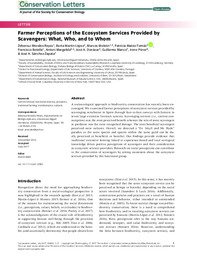Please use this identifier to cite or link to this item:
https://hdl.handle.net/11000/6005Full metadata record
| DC Field | Value | Language |
|---|---|---|
| dc.contributor.author | Morales-Reyes, Zebensui | - |
| dc.contributor.author | Martín López, Berta | - |
| dc.contributor.author | Moleón, Marcos | - |
| dc.contributor.author | Mateo Tomás, Patricia | - |
| dc.contributor.author | Botella Robles, Francisco | - |
| dc.contributor.author | Margalida, Antoni | - |
| dc.contributor.author | Donázar, José Antonio | - |
| dc.contributor.author | Blanco, Guillermo | - |
| dc.contributor.author | Pérez, Irene | - |
| dc.contributor.author | Sánchez Zapata, José Antonio | - |
| dc.contributor.other | Departamentos de la UMH::Biología Aplicada | es |
| dc.date.accessioned | 2020-05-12T09:09:46Z | - |
| dc.date.available | 2020-05-12T09:09:46Z | - |
| dc.date.created | 2017-07-13 | - |
| dc.date.issued | 2020-05-12 | - |
| dc.identifier.issn | 1755-263X | - |
| dc.identifier.uri | http://hdl.handle.net/11000/6005 | - |
| dc.description.abstract | A socioecological approach to biodiversity conservation has recently been encouraged. We examined farmer perceptions of ecosystem services provided by scavenging vertebrates in Spain through face-to-face surveys with farmers in seven large extensive livestock systems. Scavenging services (i.e., carrion consumption) was the most perceived benefit whereas the role of some scavengers as predators was the most recognized damage. The most beneficial scavengers perceived were vultures. Overall, we detected a “Dr. Jekyll and Mr. Hyde” paradox as the same species and species within the same guild can be dually perceived as beneficial or harmful. Our findings provide evidence that traditional extensive farming linked to experience-based and local ecological knowledge drives positive perceptions of scavengers and their consideration as ecosystem services providers. Research on social perceptions can contribute to the conservation of scavengers by raising awareness about the ecosystem services provided by this functional group. | es |
| dc.description.sponsorship | The study was supported by MINECO and ERDF (project CGL2015-66966-C2-1-R) | - |
| dc.description.sponsorship | Z.M.R. was supported by a pre-doctoral grant (FPU12/00823) and a mobility grant (EST15/00741) from the MECD | - |
| dc.description.sponsorship | M.M. by a Severo Ochoa Program for Centres of Excellence in R+D+I (SEV-2012- 0262) and by a research contract Ram´on y Cajal from the MINECO (RYC-2015-19231), | - |
| dc.description.sponsorship | P.M.T. by a Portuguese FCT grant (SFRH/BPD/112437/2015) | - |
| dc.description.sponsorship | A.M. by a research contract Ram´on y Cajal from the MINECO (RYC-2012- 11867). | - |
| dc.format | application/pdf | es |
| dc.format.extent | 11 | es |
| dc.language.iso | eng | es |
| dc.rights | info:eu-repo/semantics/openAccess | es |
| dc.subject | Carrion removal | es |
| dc.subject | functional diversity | es |
| dc.subject | predators | es |
| dc.subject | traditional farming | es |
| dc.subject | transhumance | es |
| dc.subject | vultures | es |
| dc.subject.other | 573 - Biología general y teórica | es |
| dc.title | Farmer Perceptions of the Ecosystem Services Provided by Scavengers: What, Who, and to Whom | es |
| dc.type | info:eu-repo/semantics/article | es |
| dc.identifier.doi | 10.1111/conl.12392 | - |
| dc.relation.publisherversion | https://doi.org/10.1111/conl.12392 | - |

View/Open:
10-Morales-Reyes_et_al-2017-Conservation_Letters.pdf
668,51 kB
Adobe PDF
Share:
.png)
